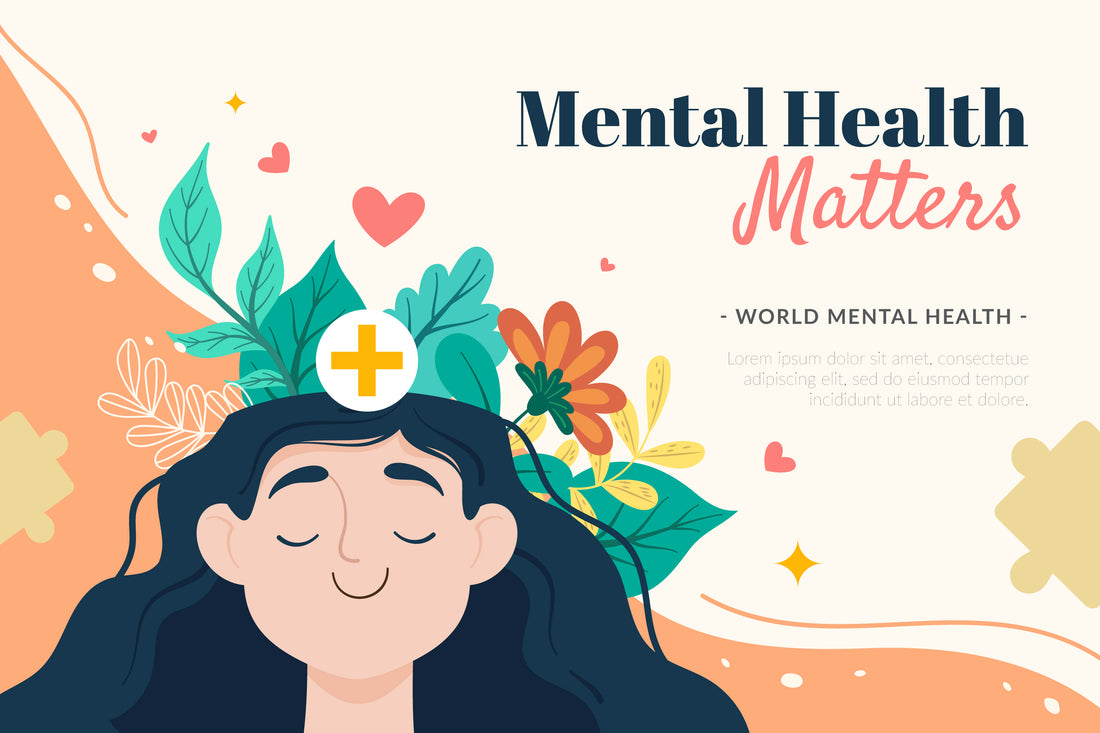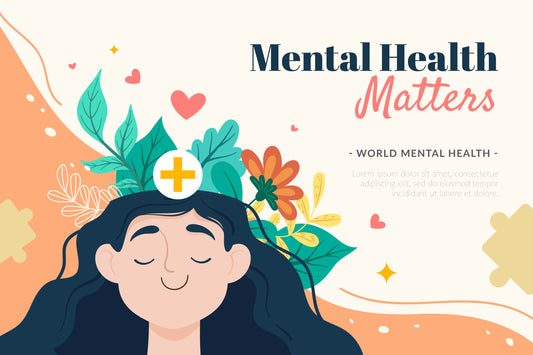The intricate connection between physical and mental health often goes unnoticed. Yet, the influence of mental well-being on physical health is profound and often unexpected. Research has shown that individuals with mental health conditions are at a higher risk of developing preventable physical health issues such as heart disease.
Genetics, low motivation, difficulty with concentration, lack of support for behavior change, and reduced likelihood of receiving medical help can all contribute to this increased risk. It's important to understand how mental health can affect your body and take steps to prioritize your overall well-being.
The Mind-Body Connection

Biological Links Between Mental and Physical Health
Some research shows that there are strong biological links between our mental and physical health. People with mental health problems are more likely to have preventable physical health conditions like heart disease. Genetics, low motivation, and lack of support can contribute to this connection.
Psychosomatic Symptoms and Disorders
One interesting aspect of the mind-body connection is psychosomatic symptoms and disorders. These are physical symptoms that are caused or worsened by mental and emotional factors. For example, depression may manifest as headaches or fatigue, while anxiety can lead to digestive problems or insomnia.
Psychosomatic symptoms and disorders highlight how deeply intertwined our mental and physical health truly are. Addressing mental health concerns can often lead to an improvement in physical symptoms, showcasing the power of taking a holistic approach to wellness.
Connection
Understanding the connection between mental and physical health is crucial for overall well-being. By recognizing how our emotions and thoughts can impact our body, we can take proactive steps to improve our health. It's important to prioritize self-care in both mental and physical aspects to achieve holistic wellness.
Key Takeaways:
- Physical Health Impact: Mental health problems can significantly increase the risk of developing preventable physical health conditions such as heart disease.
- Physical Symptoms: Mental health issues can manifest in physical symptoms like headaches, fatigue, digestive problems, and more.
- Preventive Measures: Engaging in regular exercise, maintaining a balanced diet, quitting smoking, and seeking timely medical help can help prevent physical health issues associated with mental health problems.
Mental Health and Emotional Well-being
It is crucial to pay attention to how our mental health can affect our overall well-being. Our emotional state plays a significant role in how we function on a daily basis, impacting both our physical and mental health.
Emotional Regulation and Mental Disorders
For individuals with mental disorders, emotional regulation can become challenging. Conditions such as anxiety and depression can disrupt our ability to manage our emotions effectively, leading to mood swings, heightened stress levels, and difficulties in coping with everyday challenges.
The Consequences of Untreated Mental Health Issues
Health studies have shown that untreated mental health issues can have serious consequences. Research indicates that individuals with mental health problems are more likely to develop physical health conditions such as heart disease. Additionally, the lack of support and intervention for mental health concerns can further exacerbate the situation, affecting both emotional well-being and physical health.
Emotional well-being is closely intertwined with mental health, and addressing mental health issues promptly is imperative in maintaining overall well-being.
Mental Health and Social Dynamics

Relationships and Social Interaction
On a fundamental level, our mental health can greatly influence our relationships and social interactions. Research shows that individuals with mental health issues are more likely to experience difficulties in maintaining positive connections with others. Conditions like depression and anxiety can impact communication skills, self-esteem, and the ability to engage socially. This can lead to feelings of isolation and loneliness, further exacerbating mental health challenges.
Stigma and Its Impacts on Social Standing
With stigma surrounding mental health still prevalent in society, individuals may face negative attitudes and discrimination, affecting their social standing. Stigma can result in barriers to seeking help, reluctance to disclose mental health issues, and a sense of shame or embarrassment. According to studies, nearly one in three individuals with a long-term physical health condition also experiences a mental health problem, most commonly depression or anxiety. This interplay between physical and mental health underscores the importance of addressing stigma to improve overall well-being.
Social support plays a crucial role in managing mental health, but stigma can deter individuals from seeking help or disclosing their struggles to others. Building awareness, challenging misconceptions, and promoting acceptance are important steps towards creating a more inclusive and supportive environment for those facing mental health challenges.
Mental Health in the Workplace
Job Performance and Mental Health Conditions
Not addressing mental health in the workplace can have significant consequences on job performance. Research shows that individuals with mental health conditions are more likely to experience decreased productivity and increased absenteeism, impacting overall work quality and efficiency. Any employer who overlooks the mental well-being of their employees risks facing these negative outcomes.
Workplace Support Structures and Their Importance
Their establishment of workplace support structures plays a vital role in promoting mental health among employees. Providing access to resources such as counseling, mental health days, and employee assistance programs can help individuals cope with stress and mental health challenges effectively. These structures contribute to a positive work environment by prioritizing the well-being of employees.
Structures like mental health awareness training for managers can further enhance understanding and support within the workplace. By fostering a culture of openness and support for mental health, organizations can create a conducive environment for employees to thrive both personally and professionally.

Lifestyle Factors and Mental Health
Despite the complex nature of mental health, lifestyle factors play a significant role in our overall well-being. Understanding how our daily choices impact our mental health is crucial for maintaining a balanced and healthy life.- Any imbalance in our diet and nutrition can have a profound effect on our mental health. Research shows that a balanced diet rich in necessary nutrients can help manage and prevent mental health conditions such as depression and anxiety. Consuming healthy proteins, fats, carbohydrates, vitamins, minerals, and water is necessary for optimal mental well-being.
The Role of Diet and Nutrition
Physical health problems significantly increase the risk of developing mental health problems. It's necessary to prioritize a healthy diet to support both your physical and mental well-being. Perceiving food as fuel for your body and mind can help you make more informed choices when it comes to your nutrition.
Exercise and Its Benefits for Mental Well-being
Exercise is not only beneficial for physical health but also plays a crucial role in improving mental well-being. Research shows that physical activity releases feel-good chemicals in the brain, contributing to improved mood and energy levels. Finding an exercise routine that you enjoy can reduce stress, increase focus, and provide a sense of purpose.
Wellbeing encompasses both physical and mental health, highlighting the importance of incorporating exercise into your daily routine to support overall well-being.
Coping Mechanisms and Management Strategies
Therapeutic Approaches to Mental Health
After acknowledging the significant impact of mental health on physical well-being, it is crucial to explore therapeutic approaches to managing mental health conditions. An individual experiencing mental health issues can benefit from various therapeutic interventions, including psychotherapy, cognitive-behavioral therapy, and medication. These approaches aim to address the root causes of mental health challenges, improve coping mechanisms, and enhance overall quality of life.
Self-Care and the Role of Personal Responsibility
The role of personal responsibility in self-care cannot be understated when it comes to managing mental health. The data shows that nearly one in three individuals with a long-term physical health condition also experiences a mental health problem, such as depression or anxiety. The importance of self-care practices, including regular exercise, a balanced diet, and smoking cessation, cannot be overlooked in maintaining optimal mental and physical health.
The integration of self-care practices into daily routines empowers individuals to take control of their well-being and promotes a sense of agency in managing mental health challenges. By prioritizing self-care and personal responsibility, individuals can proactively address their mental health needs and make positive lifestyle changes to support overall well-being.
The Future of Mental Health
Advances in Mental Health Research
The field of mental health research is rapidly evolving, with groundbreaking discoveries being made that could shape the future of how we understand and treat mental health conditions. Once again, researchers are delving deep into the complex interplay between physical and mental health, as nearly one in three people with a long-term physical health condition also has a mental health problem.
The incorporation of genetics, motivation, and support systems into mental health treatment plans is paving the way for more personalized and effective interventions. Understanding the link between mental health and physical health is imperative, as research shows that people with a mental health problem are more likely to have preventable physical health conditions such as heart disease.

Changing Attitudes and Societal Awareness
Any progress in the field of mental health is closely tied to changing attitudes and societal awareness. Societal perceptions of mental health are shifting, with a growing recognition of the importance of mental wellbeing. With nearly one in four individuals experiencing mental health issues during their lifetime, addressing stigma and promoting open discussions about mental health are paramount.
Societal support and understanding are crucial in creating a safe space for individuals to seek help and access appropriate resources. By destigmatizing mental health and promoting acceptance and empathy, we can foster a more inclusive and supportive society for those facing mental health challenges.
Final Words
With these considerations in mind, it is crucial to recognize the intricate relationship between mental and physical health. Mental health issues can have a profound impact on your physical well-being, increasing the risk of developing preventable conditions such as heart disease. It is crucial to address both aspects of your health in order to maintain overall well-being.
By taking proactive steps such as engaging in regular exercise, eating a balanced diet, and seeking medical attention when needed, you can empower yourself to improve your mental and physical health outcomes. Remember that mental health should not be viewed in isolation, as it can have significant implications on your overall health and quality of life. Prioritizing self-care and seeking support when needed can help you navigate the complexities of mental and physical health with resilience and strength.
FAQ
Q: How does mental health impact physical health?
A: Mental health can significantly affect physical health. Research shows that individuals with mental health issues are more prone to developing preventable physical conditions like heart disease. This can be due to genetics, low motivation, difficulty in concentration, lack of support for healthy behaviors, and a lower likelihood of receiving medical help.
Q: What physical symptoms can be linked to mental health problems?
A: Mental health problems can manifest physical symptoms such as headaches, fatigue, digestive issues, insomnia, restlessness, and difficulty concentrating. Our mind and body are interconnected, so it's common for mental health issues like depression and anxiety to have physical repercussions.
Q: How can individuals improve their physical health while dealing with mental health concerns?
A: There are several steps individuals can take to enhance their physical well-being alongside managing mental health. Engaging in regular physical activity, maintaining a balanced diet, quitting smoking, and seeking timely medical advice from a healthcare provider are all crucial measures to promote overall health.








